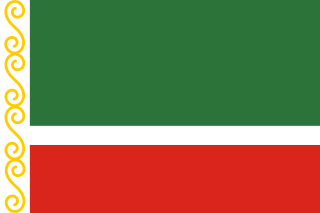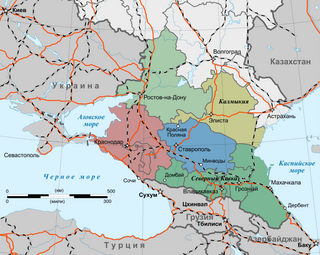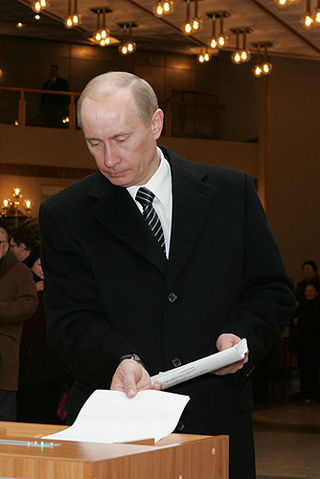
Chechnya, officially the Chechen Republic, is a republic of Russia. It is situated in the North Caucasus of Eastern Europe, between the Caspian Sea and Black Sea. The republic forms a part of the North Caucasian Federal District, and shares land borders with Georgia to its south; with the Russian republics of Dagestan, Ingushetia, and North Ossetia–Alania to its east, north, and west; and with Stavropol Krai to its northwest. After the dissolution of the Soviet Union in 1991, the Checheno-Ingush ASSR split into two parts: the Republic of Ingushetia and the Chechen Republic. The latter proclaimed the Chechen Republic of Ichkeria, which declared independence, while the former sided with Russia. Following the First Chechen War of 1994–1996 with Russia, Chechnya gained de facto independence as the Chechen Republic of Ichkeria, although de jure it remained a part of Russia. Russian federal control was restored in the Second Chechen War of 1999–2009, with Chechen politics being dominated by the former Ichkerian Mufti Akhmad Kadyrov, and later his son Ramzan Kadyrov.

The Second Chechen War took place in Chechnya and the border regions of the North Caucasus between the Russian Federation and the breakaway Chechen Republic of Ichkeria, from August 1999 to April 2009.
Spetsnaz are special forces in many post-Soviet states. Historically, this term referred to the Soviet Union's Spetsnaz GRU, special operations units of the GRU, the main military intelligence service. Today it refers to special forces branches and task forces subordinate to ministries including defence, internal affairs, or emergency situations in countries that have inherited their special purpose units from the now-defunct Soviet security agencies.

The Federal Security Service of the Russian Federation is the principal security agency of Russia and the main successor agency to the Soviet Union's KGB; its immediate predecessor was the Federal Counterintelligence Service (FSK) which was reorganized into the FSB in 1995. The three major structural successor components of the former KGB that remain administratively independent of the FSB are the Foreign Intelligence Service (SVR), the Federal Protective Service (FSO), and the Main Directorate of Special Programs of the President of the Russian Federation (GUSP).

The North Caucasus, or Ciscaucasia, is a region in Europe governed by Russia. It constitutes the northern part of the wider Caucasus region, which forms the natural border between Eastern Europe and Western Asia. It is bordered by the Sea of Azov and Black Sea to the west, the Caspian Sea to the east, and the Caucasus Mountains to the south. The region shares land borders with the South Caucasus countries of Georgia and Azerbaijan. Located in the south of the region, Mount Elbrus is the tallest peak in Europe. Among its urban centres, Krasnodar is the most populous.

Doku Khamatovich Umarov, also known as Dokka Umarov as well as by his Arabized name of Dokka Abu Umar, was a Chechen mujahid in North Caucasus. Umarov was a major military figure in both wars in Chechnya during the 1990s and 2000s, before becoming the leader of the greater insurgency in the North Caucasus. He was active mostly in south-western Chechnya, near and across the borders with Ingushetia and Georgia.

Alexander Vasilyevich Bortnikov is a Russian intelligence officer who has served as the director of the Federal Security Service (FSB) since 2008. He is one of the most powerful members of the silovik faction of president Vladimir Putin's inner circle. A Hero of the Russian Federation since 2019, he also holds the rank of General of the Army, the second highest grade in use in the Russian military. According to some experts, it is likely Bortnikov played a key role in Putin's decision to invade Ukraine in 2022.

Blowing Up Russia: Terror from Within is a book written by Alexander Litvinenko and Yuri Felshtinsky. The authors describe the Russian apartment bombings as a false flag operation that was guided by the Russian Federal Security Service to justify the Second Chechen War and bring Vladimir Putin to power. The story was initially printed by Yuri Shchekochikhin in a special issue of Novaya Gazeta in August 2001 and published as a book in 2002. In Russia, the book was prohibited because it divulged state secrets, and it was included in the Federal List of Extremist Materials. However, it was published in more than twenty other countries and translated into twenty languages.

The fairness of the 2008 Russian presidential election is disputed, with election monitoring groups giving conflicting reports. Most official reports accept that not all candidates had equal media coverage and that some election monitoring groups had restricted access to perform their role. Monitoring groups found a number of other irregularities, but made no official reports of fraud or ballot stuffing.

Yunus-bek Bamatgireyevich Yevkurov is a Russian colonel general and politician. For over 10 years he was the head of the southern Russian republic of Ingushetia, appointed by President Dmitry Medvedev on 30 October 2008. The following day, the People's Assembly of the Republic of Ingushetia, the republic's regional parliament, voted in favor of Yevkurov's appointment, making him the third Head of Ingushetia. He is a career soldier, paratrooper, and Hero of the Russian Federation who was involved in numerous conflicts where Russia played a key role, including Kosovo (1999) and Chechnya. On 22 June 2009, Yevkurov was seriously injured following a car-bomb attack on his motorcade in the city of Nazran.

The Insurgency in Ingushetia began in 2007 as an escalation of an insurgency in Ingushetia connected to the separatist conflict in Chechnya. The conflict has been described as a civil war by local human rights activists and opposition politicians; others have referred to it as an uprising. By mid-2009 Ingushetia had surpassed Chechnya as the most violent of the North Caucasus republics. However, by 2015 the insurgency in the Republic had greatly weakened, and the casualty toll declined substantially in the intervening years.

The insurgency in the North Caucasus was a low-level armed conflict between Russia and militants associated with the Caucasus Emirate and, from June 2015, the Islamic State, in the North Caucasus. It followed the (Russian-proclaimed) official end of the decade-long Second Chechen War on 16 April 2009. It attracted volunteers from the MENA region, Western Europe, and Central Asia. The Russian legislation considers the Second Chechen War and the insurgency described in this article as the same "counter-terrorist operations on the territory of the North Caucasus region".

The 2009 Nazran bombing occurred on 17 August 2009, in Nazran, the largest city of the Republic of Ingushetia in the Russian Federation. A suicide car bomber attacked police headquarters, and at least 25 people were killed and 164 injured. It was the most serious terrorist attack in Ingushetia in the early 21st century, where there had been social and political unrest related to independence movements.

The 2009 Nevsky Express bombing occurred on 27 November 2009 when a bomb exploded under a high speed train travelling between the Russian cities of Moscow and Saint Petersburg causing derailment near the town of Bologoye, Tver Oblast, on the Moscow–Saint Petersburg Railway. The derailment occurred at 21:34 local time. Russian officials had stated that 39 people were killed and 95 injured but later retracted that estimate. 27 deaths had been reported by 2 December. A second bomb exploded at the scene of the investigation the following day, injuring one. It was reported to have been triggered by a remote mobile phone.

Dmitry Gennadyevich Medvedev was a Lieutenant-Colonel in the Federal Security Service of the Russian Federation who was killed in action in Chechnya. For his service he was posthumously honoured as a Hero of the Russian Federation.

The 2010 Moscow Metro bombings were suicide bombings carried out by two female Islamic terrorists during the morning rush hour of March 29, 2010, at two stations of the Moscow Metro, with roughly 40 minutes in between. At least 40 people were killed, and over 100 injured.

People's Freedom Party "For Russia without Lawlessness and Corruption" was a liberal-democratic political party in Russia founded on 13 December 2010 by opposition politicians Vladimir Ryzhkov, Boris Nemtsov, Mikhail Kasyanov and Vladimir Milov and de facto dissolved on 16 June 2012. The name is a reference to the original liberal-democratic Party of Popular Freedom.
Events from the year 2012 in the Russia

On 4 December 2014, a group of armed militants of the jihadist organization Caucasus Emirate attacked a traffic police checkpoint outside the city of Grozny, Chechnya, Russia. The militants then entered the city and occupied the "Press House" building in the city center and a nearby school.

The Islamic State insurgency in the North Caucasus is ongoing terror activity of the Islamic State branch in the North Caucasus after the insurgency of the Caucasus Emirate.


















